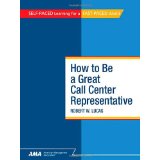Customer Service Skill – Listening to the Customer
Successful listening is essential for any customer service representative to achieve customer service excellence. Like any other customer service skill, active listening is a learned behavior that some people perform better than others. To provide the best customer service possible you must master this skill, especially as part of telephone etiquette when dealing with customers over the telephone.
Some common characteristics possessed by most effective listeners include:
- Empathy. Putting yourself in the customer’s place and trying to relate to the customer’s needs, wants, and concerns.
- Understanding. The ability to listen as customers speak in order to ensure that you realize what they want, need and expect. This is essential in properly servicing the customer.
- Patience. Taking the time to pause and listen attentively as your customer speaks. Keep in mind that it is your job to serve the customer and that not everyone communicates in the same manner. Thus, you must put forth the effort to allow your customer to share their ideas, issues or questions without interrupting in order to determine their needs.
- Attentiveness. By focusing your attention on the customer, you can better interpret his or her message and satisfy his or her needs. Attentiveness is often displayed through nonverbal cues (e,g, nodding or cocking of the head to one side or the other, smiling, or using paralanguage).
- Objectivity. In dealings with customers, try to avoid subjective opinions or judgments. If you have a preconceived idea about customers, their concerns or questions, the environment, or anything related to the customers, you could mishandle the situation.
The characteristics of effective and ineffective listeners are summarized below.
Characteristics of Effective and Ineffective Listeners
| Many factors can indicate an effective or ineffective listener. Over the years, researchers have assigned the following characteristics to effective and ineffective listeners. As a customer service professional, strive to master the skills in the left column and work to eliminate those in the right column in order to better serve your customers. | |
| Effective Listeners | Ineffective Listeners |
| Focused | Inattentive |
| Responsive | Uncaring |
| Alert | Distracted |
| Understanding | Unconcerned |
| Caring | Insensitive |
| Empathetic | Smug/conceited |
| Unemotional | Emotionally involved |
| Interested | Self-centered |
| Patient | Judgmental |
| Cautious | Disorganized |
| Open | Defensive |
For additional ideas on listening to the customer and providing excellent customer service, get a copy of Customer Service Skills for Success.



